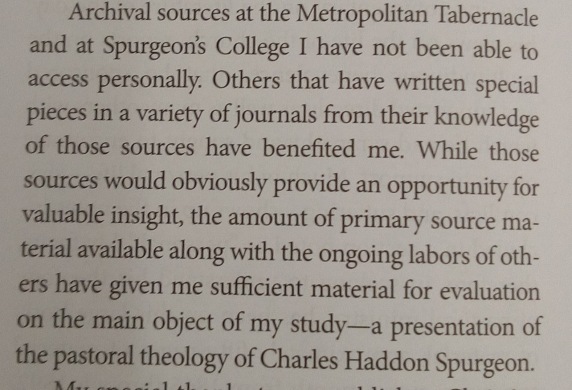
Cataloguing a biography of Charles Spurgeon in my librarian job, I noticed this convolutedly-worded confession in the preface. The book is a comprehensive biography of 700 pages in two columns (such a strange layout) described by one reviewer as an ‘immense and monumental portrait’, yet the author did not manage to get to the major archives for his subject at all. I take this as a consolation for my lack of recent access to Katharine’s papers in Canberra; yet it seems an unforgivable hole in a biography.
In the first two years, I made four trips to Canberra and two to Melbourne. But still I fret over the archives, over the fact I may not make it again anytime soon and the thought of all the things I’ve missed. (I didn’t copy as much of the material beyond 1919, where the project was initially finishing.)
Not being able to get to Canberra has made me find work arounds. My university library has procured me copies of papers I have location numbers for. (I am waiting anxiously for them to tell me I’ve asked for too many!) Right here in Perth I recently stumbled across the boxes of material gathered by a previous PhD student attempting a biography of Katharine Susannah Prichard. It had some significant material I’d not copied and I’m so grateful for her foresight and generosity in leaving them to future scholars. I’ve gone back more carefully over the photographs I took from the archive and found whole folders I didn’t realise I had. And I’ve reached the Western Australian years and found many things at the State Library of WA, even an eyewitness account of Katharine’s death.
I’ve learned about an important paradox in writing a biography anyway: the hunger for archives is in tension with the readers’ patience. The biographer will usually have more material than the reader wants to read.

We rely on you to go through the archives, to sort the nuggets from the dross, and then, not just to list them for us, but to construct a story from them. So, the nuggets we want to read about are those that form the building blocks of your story.
LikeLike
True, so more archival work will mean more nuggets, but probably shouldn’t mean a longer book, just a better one…
LikeLike
Is there a grant you can apply for, to pay for a trip to Canberra?
LikeLike
It’s not a financial barrier so much as having a toddler. May yet get there this year!
LikeLike
Ah, yes, your little research assistant. I can see the problem!
LikeLiked by 1 person
This is interesting. I had a similar problem – the archive was in Sydney and I live near Melbourne. My workaround was to obtain copies of my subject’s letters on a CD. Tootling around the SLNSW website, I found a page that said such CDs were for sale, although when I contacted the library no one seemed to know anything about it and I never could find that page again! Much emailing and form filling ensued but, eventually, I got the CD. Not as good as the whole archive, but not nothing. On another occasion, I was told Elizabeth Macarthur’s letters were in the process of being digitised and would be available online ‘soon’. And they kindly offered to put up the ones I most needed, first. This didn’t actually happen (nor did the digitisation project, as far as I can see) but it alerted me to the possibilities. In my experience, librarians are very kind people. So I’d suggest you get in touch, tell them your problem, and see what they might be able to do. Or just work with what you have – I’m willing to bet it’s enough. Good luck!
LikeLike
Yes, similar to you, my experience has been that if I know the location number for a document, I can usually get a copy of it – especially from NLA. But as you might have experienced too it’s the sifting and browsing which produces the serendipitous discoveries not previously known to anyone. It’s been interesting for me as a librarian to be on the other side of the desk; most of them have been helpful.
LikeLiked by 1 person
Yes! The serendipity is everything. Which makes me sad for biographers who use researchers – they’re missing half the fun (and half the relevant info, I suspect)
LikeLiked by 1 person
Yes, not just cheating, also missing out! (We’re looking at you, Peter Fitzsimmons.)
LikeLike